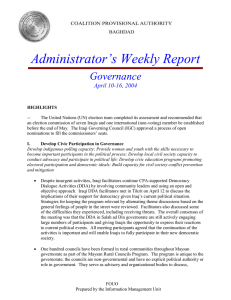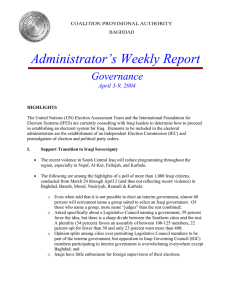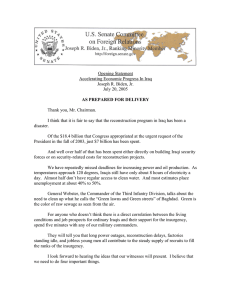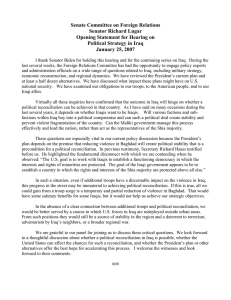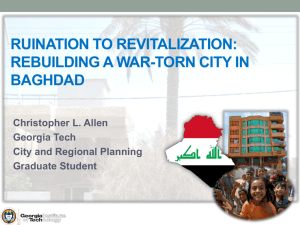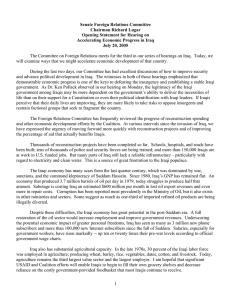Administrator’s Weekly Report Governance May 15-21, 2004
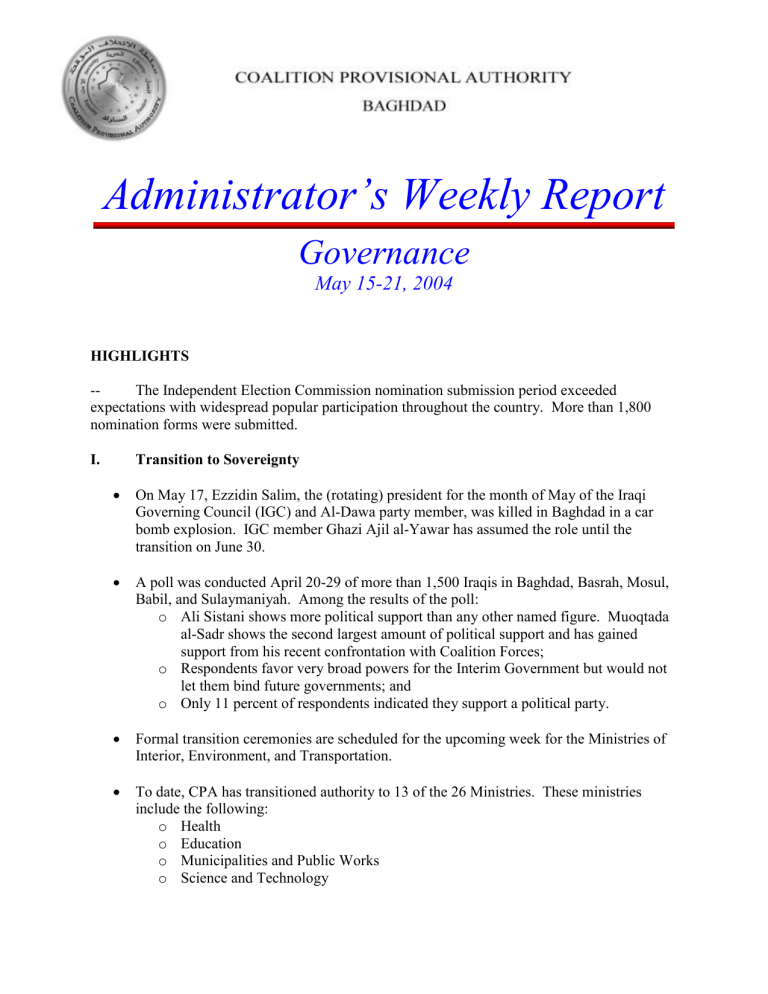
Administrator’s Weekly Report
Governance
May 15-21, 2004
HIGHLIGHTS
-- The Independent Election Commission nomination submission period exceeded expectations with widespread popular participation throughout the country. More than 1,800 nomination forms were submitted.
I.
Transition to Sovereignty
On May 17, Ezzidin Salim, the (rotating) president for the month of May of the Iraqi
Governing Council (IGC) and Al-Dawa party member, was killed in Baghdad in a car bomb explosion. IGC member Ghazi Ajil al-Yawar has assumed the role until the transition on June 30.
A poll was conducted April 20-29 of more than 1,500 Iraqis in Baghdad, Basrah, Mosul,
Babil, and Sulaymaniyah. Among the results of the poll: o Ali Sistani shows more political support than any other named figure. Muoqtada al-Sadr shows the second largest amount of political support and has gained support from his recent confrontation with Coalition Forces; o Respondents favor very broad powers for the Interim Government but would not let them bind future governments; and o Only 11 percent of respondents indicated they support a political party.
Formal transition ceremonies are scheduled for the upcoming week for the Ministries of
Interior, Environment, and Transportation.
To date, CPA has transitioned authority to 13 of the 26 Ministries. These ministries include the following: o Health o Education o Municipalities and Public Works o Science and Technology
o Culture o Agriculture o Planning and Development o Displacement and Migration o Water Resources o Industry and Minerals o Foreign Affairs o Justice o Youth and Sport
Participants at the May 15 Baghdad town hall meeting discussed the process for national elections. An Iraqi Governing Council (IGC) member and two United Nations (UN) representatives made introductory remarks, followed by an extensive question and answer session for the 250 Baghdad area residents who attended the event. This meeting was the third town hall event for the Baghdad community held this year.
II.
Develop Civic Participation in Governance
Develop indigenous polling capacity; Provide women and youth with the skills necessary to become important participants in the political process; Develop local civil society capacity to conduct advocacy and participate in political life; Develop civic education programs promoting electoral participation and democratic ideals; Build capacity for civil society conflict prevention and mitigation
The CPA/Local Governance Project (LGP) hosted more than 1,400 democracy development activities (DDA) across Iraq this week. To date, almost 9,000 democracy
DDA events have been held across Iraq, including more than 6,400 events for citizens and civic groups. In total, more than 280,000 Iraqis have participated in these events.
DDA facilitators continue to address questions regarding the Transitional Administrative
Law (TAL) and other topics from event participants while also working to explain the
TAL to citizens. The comments from the North appear biased toward a Kurdish viewpoint with issues such as Kurdish rights and suggestions for more autonomy regarding the Kurdish population.
DDA participants continue to discuss the representation of women as proposed in the
TAL. Respondents offer mixed opinions on the rights of women in general and as outlined in the TAL. More men typically voice opinion against women’s rights and women tend to support the issue of women’s rights.
More than 100 students, including 48 women, attended a May 16 lecture at the Technical
Institute of As Sulaymaniyah, the sixth lecture in a series of 12, which aims to engage youth in democratic dialogue. The event was sponsored by the Kurdish Institute for
Elections (KIE), under an LGP grant as part of the Youth Civic Education Awareness
Campaign.
2
FOUO
Prepared by the Information Management Unit
In Basrah, more than 500 people participated in 19 DDA events this week. Most participants expressed reservations about federalism. Some participants, however, expressed the view that federalism would add strength to the states. Other feedback from the events include: o There should be more emphasis on fair and open elections under the supervision of the United Nations; o The Transitional Administrative Law (TAL) must address explicitly how to deal with armed militias in a democratic Iraq; o Iraqis who have resided in Iraq during the entire period of the Ba’athist regime should have priority in governing Iraq over those that returned from abroad; o The only solution to eliminating violence, killing, and looting is to offer more job opportunities; o Honesty and credibility of the media would help in creating a new democratic
Iraq; and o National reconciliation will secure peace.
In Sulaymaniyah, the CPA/LGP provided grant funding for the Halabja Women’s Center to assist the center in offering literacy classes and a fully equipped library.
CPA/LGP assistance to the Northern Iraq Women’s Mobile Teams is one-third complete.
This project will increase access to basic services, improve the health and social situation of women and children, and raise awareness of violence against women and other issues.
The CPA continued work with the Khatuzeen Women’s Center for Social Action to secure equipment for a women’s radio station. The center was established in 1983 to focus on support of women and children’s issues in the Arbil community. The radio station will enhance the capacity of the center to increase the reach to women in the community and provide them with a greater understanding of current events and political issues.
III.
Develop Framework and Capacity for Elections
Support creation of National Independent Electoral Commission; Promote scopes of work and operational linkages between national, regional, and local level election administration authorities
Response to the Independent Election Commission nomination period exceeded expectations with widespread popular participation throughout the country.
Approximately 1,900 nomination forms were submitted. Six percent of the nominees are women.
The next step in the United Nations-sponsored process is the vetting of the approximately
1,900 submissions and selecting twenty five candidates to be interviewed in Baghdad
May 23-28. The UN interview panel will consist of former and current election commissioners and administrators from around the world.
3
FOUO
Prepared by the Information Management Unit
Fifteen commissioner candidates and three Chief Election Officer candidates will next be submitted to the Iraqi Governing Council (IGC) for their review. The final selection, seven Commissioners and the Chief Election Officer, will be approved by the CPA.
Candidates who were not selected will be maintained in a central data base for consideration for positions in the provincial electoral administration or vacancies on the
Commission.
IV.
Promote Respect for Human Rights
Educate on human rights issues; Preserve documentation of past atrocities, raise awareness, and promote reconciliation; Strengthen local capacity to investigate and address past atrocities;
Establish Iraqi Special Tribunal (IST) for past atrocities; Incorporate human rights into laws;
Develop role of independent human rights NGOs and media; Establish a human rights ministry
The CPA/Office of Transition Initiatives (OTI) continues to support efforts to address human rights and transitional justice issues in regard to abuses and crimes against humanity by the former regime. Two grants to supplement the on-going work of the IST were awarded this week to provide equipment and office space for IST staff. These awards will facilitate the functioning of the IST so that trials may be conducted in a fair, efficient manner consistent with international human rights standards.
The Ministry of Human Rights is preparing for a nationwide oral history project to train
Iraqis to interview thousands of people about regime crimes. This project will supplement the efforts of the IST by providing detailed recordings of victim testimony for missing persons, academic research and an aid to a future truth Commission.
Ministry of Human Rights staff continues to sort through and identify documents relating to human rights abuses by the former regime. These documents will be scanned at a specialist site, and searched using Optical Character Recognition and automatic translation software so that they may be used for the IST and other Ministry purposes.
V.
Promote Durable Solutions for Refugees and Internally Displaced Persons (IDPs)
Facilitate the return of refugees and IDPs; Build local and national capacity to protect and assist refugees and IDPs; Develop and implement the Iraq Property Claims Commission (IPCC) for property disputes
The Ministry of Displacement and Migration (MoDM) staff compiled five proposals for the Iraq Reconstruction Fund Facility for Iraq (IRFFI) meeting in Doha, Qatar May 25 and 26. In cooperation with the United Nations High Commission on Refugees
(UNHCR), the MoDM has invited donors attending the meeting to a voluntary consultations session at the end of the first day of meetings. The MoDM’s Director
General for Humanitarian affairs will be the MoDM representative in the Iraqi delegation and will lead the consultations.
4
FOUO
Prepared by the Information Management Unit
The Minister of Displacement and Migration traveled in Iran for nearly two weeks to meet with representatives from the Iranian Interior and Foreign Affairs ministries. A large delegation went from the MoDM and one representative from the Iraqi Ministry of
Foreign Affairs. The delegation met with refugees in a camp in southwestern Iran, near the Iraqi border, and found no signs of overt pressure on refugees to leave, or subtle changes that would encourage refugees to leave. The refugees remaining in the camp cited security concerns about returning to Iraq. The minister continued to encourage the
Iranian authorities to not push the return of Iraqis until the situation in Iraq improves.
The MoDM has requested the International Organization for Migration (IOM) to assist with the return of approximately 100 Iraqis in Baku, Azerbaijan who want to return. The
Iraqi Mission in Pakistan has been approached about assisting the return of more Iraqis from Pakistan. The Iraqi Mission has requested logistical support from the United Arab
Emirates.
The return of 378 Iraqis from Lebanon is underway – the returnees are expected in
Baghdad on May 23. This return was facilitated by the UNHCR, IOM, MNF-I, the Iraqi
Ministry of the Interior and the MoDM.
Currently, 19 IPCC offices are operating: Duhok, Mosul, Erbil, Sulimania, Tuz, Tikrit, 6 in Kirkuk, Khanakin, Baquba, 3 in Baghdad, Hilla and Basra. The most recent office opened was in Tikrit in Salah ad Din governorate. Large crowds turned out for the opening due to the large numbers of people moved from their land by the former regime.
To date 2,582 claims have been accepted.
The national media campaign has been delayed due to the assassination of IGC President
Ezzedine Salim, who was going to lead a national roll out of IPCC on May 22. The
MoDM is currently looking at other alternatives for a national media campaign.
Three major IPCC policy issues remain to be fully resolved: o The question of whether the IPCC mechanism can be used by those people forced out of their homes by ethnic conflict since the end of the war. o How a compensation scheme, which will be an essential part of the IPCC process, will work. o How mediation is to be included in the framework of decision-making for the
IPCC.
There are three pillars of the Regional Commission that the IPCC is working to constitute: Judicial, Land Registration and State Property. Training was successfully undertaken last week for all Judicial Candidates. The process of appointment and organizing candidates from Land Registration and State Property was set back when the
Drector General for State Property was assassinated several days ago. The IPCC will work with the new Director General to organize and train these candidates who, with the
Judicial appointments, will make decisions on claims. The Regional Commissions will begin making judgments at the end of June.
5
FOUO
Prepared by the Information Management Unit
6
FOUO
Prepared by the Information Management Unit
